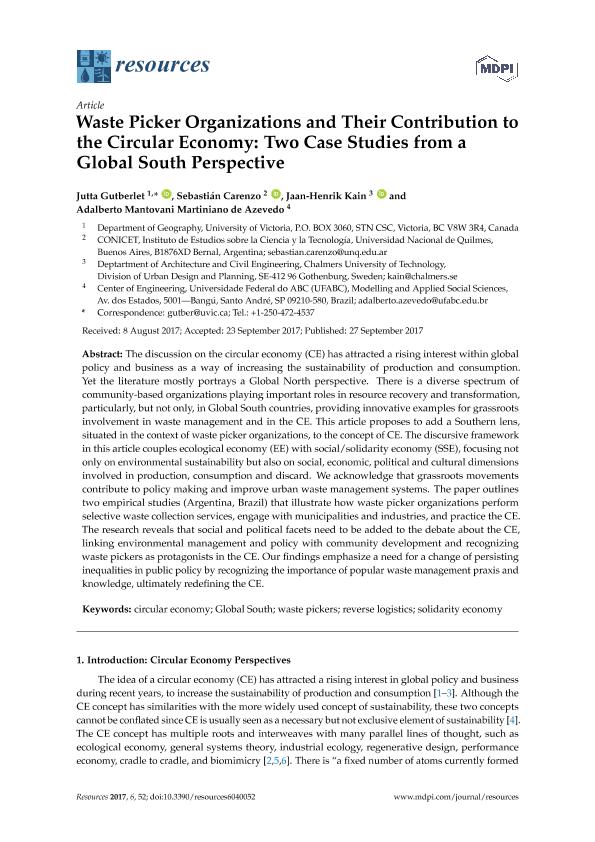Mostrar el registro sencillo del ítem
dc.contributor.author
Gutberlet, Jutta
dc.contributor.author
Carenzo, Sebastian

dc.contributor.author
Kain, Jaan Henrik
dc.contributor.author
de Azevedo, Adalberto Mantovani Martiniano
dc.date.available
2018-04-09T18:53:10Z
dc.date.issued
2017-12
dc.identifier.citation
Gutberlet, Jutta; Carenzo, Sebastian; Kain, Jaan Henrik; de Azevedo, Adalberto Mantovani Martiniano; Waste picker organizations and their contribution to the circular economy: Two case studies from a Global South Perspective; MDPI AG; Resources; 6; 4; 12-2017; 1-12
dc.identifier.issn
2079-9276
dc.identifier.uri
http://hdl.handle.net/11336/41385
dc.description.abstract
The discussion on the circular economy (CE) has attracted a rising interest within global policy and business as a way of increasing the sustainability of production and consumption. Yet the literature mostly portrays a Global North perspective. There is a diverse spectrum of community-based organizations playing important roles in resource recovery and transformation, particularly, but not only, in Global South countries, providing innovative examples for grassroots involvement in waste management and in the CE. This article proposes to add a Southern lens, situated in the context of waste picker organizations, to the concept of CE. The discursive framework in this article couples ecological economy (EE) with social/solidarity economy (SSE), focusing not only on environmental sustainability but also on social, economic, political and cultural dimensions involved in production, consumption and discard. We acknowledge that grassroots movements contribute to policy making and improve urban waste management systems. The paper outlines two empirical studies (Argentina, Brazil) that illustrate how waste picker organizations perform selective waste collection services, engage with municipalities and industries, and practice the CE. The research reveals that social and political facets need to be added to the debate about the CE, linking environmental management and policy with community development and recognizing waste pickers as protagonists in the CE. Our findings emphasize a need for a change of persisting inequalities in public policy by recognizing the importance of popular waste management praxis and knowledge, ultimately redefining the CE.
dc.format
application/pdf
dc.language.iso
eng
dc.publisher
MDPI AG
dc.rights
info:eu-repo/semantics/openAccess
dc.rights.uri
https://creativecommons.org/licenses/by-nc-sa/2.5/ar/
dc.subject
Circular Economy
dc.subject
Global South
dc.subject
Reverse Logistics
dc.subject
Solidarity Economy
dc.subject
Waste Pickers
dc.subject.classification
Otras Ciencias Sociales

dc.subject.classification
Otras Ciencias Sociales

dc.subject.classification
CIENCIAS SOCIALES

dc.title
Waste picker organizations and their contribution to the circular economy: Two case studies from a Global South Perspective
dc.type
info:eu-repo/semantics/article
dc.type
info:ar-repo/semantics/artículo
dc.type
info:eu-repo/semantics/publishedVersion
dc.date.updated
2018-04-09T15:21:13Z
dc.journal.volume
6
dc.journal.number
4
dc.journal.pagination
1-12
dc.journal.pais
Suiza

dc.journal.ciudad
Basel
dc.description.fil
Fil: Gutberlet, Jutta. University Of Victoria; Canadá
dc.description.fil
Fil: Carenzo, Sebastian. Universidad Nacional de Quilmes. Departamento de Ciencias Sociales. Instituto de Estudios Sociales de la Ciencia y la Tecnología; Argentina
dc.description.fil
Fil: Kain, Jaan Henrik. Chalmers University Of Technology; Suecia
dc.description.fil
Fil: de Azevedo, Adalberto Mantovani Martiniano. Universidade Federal do ABC; Brasil
dc.journal.title
Resources
dc.relation.alternativeid
info:eu-repo/semantics/altIdentifier/doi/http://dx.doi.org/10.3390/resources6040052
dc.relation.alternativeid
info:eu-repo/semantics/altIdentifier/url/http://www.mdpi.com/2079-9276/6/4/52
Archivos asociados
